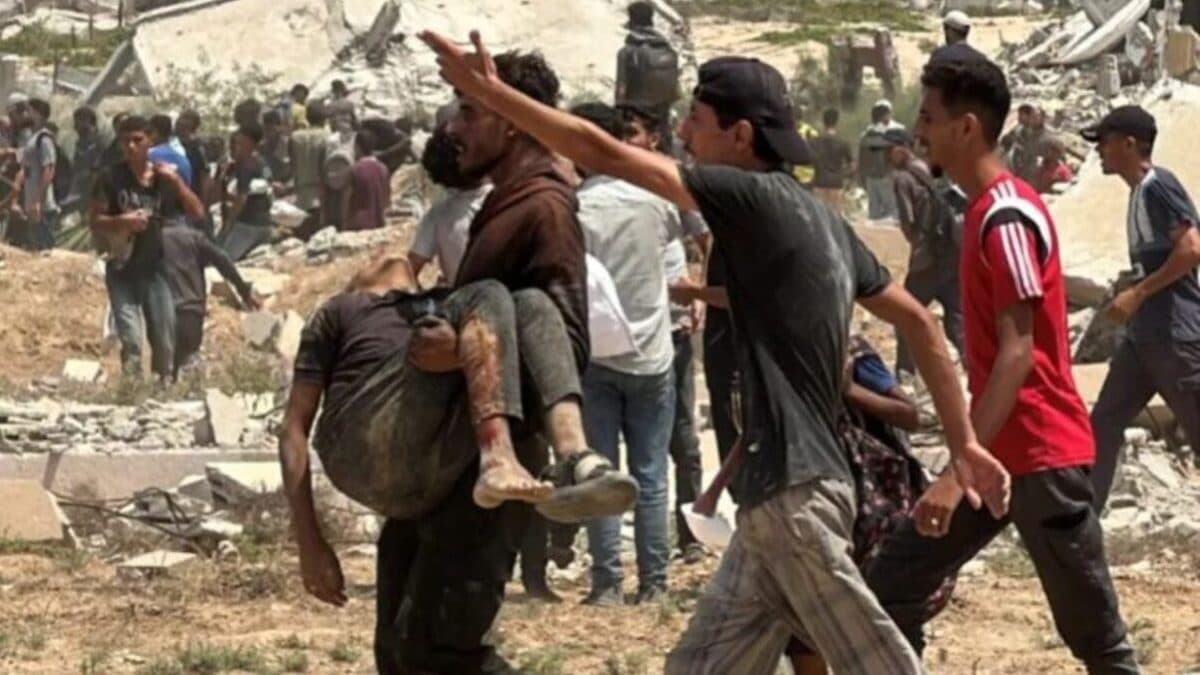Palestinian teenager killed by falling aid box in Gaza amid rising warnings over airdrop dangers
A 15-year-old Palestinian boy was killed on 9 August when a falling aid pallet struck him during an airdrop in Gaza. The incident highlights growing concerns over the safety and effectiveness of humanitarian airdrops as famine deaths and aid-related casualties rise across the enclave.

- Fifteen-year-old Muhannad Zakaria Eid was killed by a falling aid box during an airdrop in central Gaza on 9 August.
- The UN has warned that airdrops are dangerous and has urged Israel to open more land crossings for humanitarian aid.
- Starvation-related deaths in Gaza have reached at least 217 since the war began, including 100 children.
A 15-year-old Palestinian boy has died after being struck by a falling pallet during an airdrop of humanitarian aid in Gaza on Saturday, 9 August 2025.
According to Anadolu Ajansi, the victim, Muhannad Zakaria Eid, was hit in the head by a box in the Al-Nuwairi Hill area, west of the Nuseirat refugee camp. He was rushed to Al-Awda Hospital, where he was pronounced dead.
Eid’s brother told Reuters that the teenager had been trying to collect aid dropped from aircraft when tragedy struck. “Despite the famine and the hard conditions that we live in, my brother went to get aid that was dropped into the sea by planes. A box fell on him directly and he was martyred,” he said.
He expressed frustration at the international airdrop operations, saying: “They cannot enter the aid through the crossing but they drop them over us and kill our children. A kid was killed in Zawayda and here and there, and nobody feels us. God is sufficient for us, against them and their aid.”
The incident underscores the growing humanitarian crisis in Gaza, where aid deliveries by air have become increasingly frequent but also increasingly perilous.
The United Nations and several humanitarian organisations have repeatedly warned that airdrops are “dangerous, inefficient, and costly”. Anadolu reported that three similar incidents have occurred since multiple countries began parachuting aid into Gaza on 16 July.
The UN has called on Israel to allow a consistent and safe flow of humanitarian supplies via land crossings instead of relying on high-risk air operations.
According to the Gaza Government Media Office, at least 23 Palestinians have been killed and another 124 injured in airdrop-related incidents since Israel’s war on the enclave began in October 2023.
“We have repeatedly warned of the danger of these inhumane methods and have repeatedly called for the entry of aid through land crossings in a safe and sufficient manner, especially food, infant milk, medicines, and medical supplies,” the office said in a statement.
On Sunday, Gaza’s Ministry of Health reported that at least five more Palestinians, including two children, had died from starvation in the previous 24 hours.
According to Al Jazeera, this brings the total number of deaths from malnutrition since the start of the war to 217, including 100 children. The World Health Organization confirmed 63 such deaths in July alone, including 25 children, nearly all under the age of five.
Humanitarian organisations have warned that food scarcity is worsening as access to aid remains severely restricted. Families are reportedly surviving on a fraction of the daily calories needed for sustenance, while hospitals are running out of nutritional supplements and medical supplies.
The Gaza Humanitarian Foundation (GHF) — a US- and Israel-backed initiative launched in late May — has claimed to deliver more than 115 million meals to Gaza so far. GHF replaced the UN-led aid system after Israel accused the UN of allowing Hamas to seize supplies.
However, UN agencies and international relief groups have condemned the move, saying it undermines humanitarian neutrality and increases risks to civilians. UN estimates suggest nearly 1,400 Palestinians have been killed near aid distribution points since late May, including more than 800 at GHF-run sites secured by American contractors and Israeli forces, and another 514 along convoy routes.
On Friday, 8 August, the World Food Programme (WFP) urged Israel to permit at least 100 aid trucks to enter Gaza each day. Currently, only 60 WFP truck drivers have been vetted and approved by the Israeli military.
“Since July 27, 266 WFP trucks arriving at crossing points were turned back, 31 per cent of which had initially been approved,” the agency reported. “Convoy movements are frequently hampered by last-minute changes by Israeli authorities, and heavy insecurity due to military activities along convoy routes.”
The WFP stressed that the flow of humanitarian assistance must be predictable, safe, and unimpeded. It also called for faster clearances for truck movements inside Gaza, alongside assurances that all military forces respect humanitarian rules of engagement — including the prohibition of armed presence or gunfire near aid convoys, food distribution points, and other relief operations.
“Above all, what’s needed now is a ceasefire so that WFP can deliver vital aid safely, securely, predictably, and at scale to everyone inside Gaza,” the agency added.
The ongoing conflict, which escalated on 7 October 2023, has killed more than 61,400 Palestinians, including over 18,400 children, according to Gaza’s Ministry of Health. Tens of thousands more remain missing or injured, and widespread famine conditions continue to deepen the humanitarian catastrophe.
Aid agencies have warned that without immediate and sustained access to Gaza through land crossings, airdrops will continue to risk civilian lives while failing to meet the population’s urgent needs.
As the death of Muhannad Zakaria Eid illustrates, the desperation to secure food and basic necessities amid the conflict is costing more lives even as international relief efforts persist.







